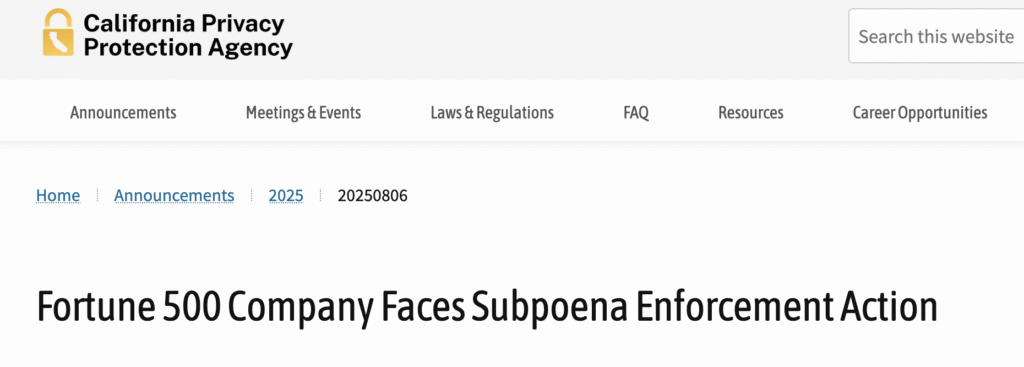In a significant escalation of privacy enforcement, the California Privacy Protection Agency (CPPA) has filed its first judicial action to compel a Fortune 500 company to comply with an investigative subpoena. Announced the other day, this move targets Tractor Supply Company (NASDAQ: TSCO), the nation’s largest rural lifestyle retailer, amid suspicions of California Consumer Privacy Act (CCPA) violations. For privacy professionals, this case underscores the growing teeth of California’s privacy regime and signals that no company is too big to evade scrutiny as we’ve been warning businesses to get compliant when we showcase the Healthline & Honda fines as just the beginning.
Reach out to a Captain Compliance team member to learn how we can automate your CCPA compliance and handle all of your privacy requirements through our tools.

The Case Against Tractor Supply: Opt-Out Rights in the Spotlight
The CPPA’s Enforcement Division is probing whether Tractor Supply failed to honor Californians’ right to opt-out of the sale and sharing of their personal information online—a core pillar of the CCPA. Despite serving a subpoena, the company allegedly refused to provide sworn answers about its business practices during specified periods. This prompted the CPPA to seek court intervention, marking the agency’s first public disclosure of an ongoing investigation and its inaugural judicial enforcement of an investigative request.
Michael Macko, head of the CPPA’s Enforcement Division, emphasized the agency’s resolve: “We will not hesitate to seek the court’s assistance when necessary to advance our investigations and protect Californians’ privacy rights. We look forward to addressing the merits of this dispute in court.” The petition was filed in Superior Court, though details on the exact location remain unspecified.
For privacy professionals tracking CCPA developments, this case highlights the increasing focus on opt-out mechanisms. Under the CCPA, consumers have the right to prevent their data from being sold or shared, and businesses must provide clear, accessible ways to exercise this right, such as prominent links on websites. Tractor Supply’s alleged non-compliance could stem from inadequate processes for handling these requests, perhaps due to technical glitches, unclear policies, or insufficient staff training. If proven, it could lead to not only subpoena compliance but also broader remedial actions, like system overhauls and employee education programs.
Expanding on the subpoena’s role, these investigative tools allow the CPPA to gather evidence without immediate litigation, but when met with resistance, as here, they escalate to court orders. This step demonstrates the agency’s willingness to use all available levers to enforce transparency, setting a tone for future probes into data practices across industries.
Why This Privacy Enforcement Matters: A Pattern of Aggressive Enforcement
This action isn’t isolated; it’s part of the CPPA’s ramped-up efforts to enforce privacy laws. Recent cases highlight a trend toward holding companies accountable for CCPA lapses, with fines and mandated changes becoming commonplace. Here’s a rundown of key enforcement actions from 2025:
- Todd Snyder: Fined $345,178 and required to overhaul practices for CCPA violations.
- American Honda Motor Co.: Hit with a $632,500 fine—one of the highest in CCPA history—and ordered to change data-handling processes.
- Background Alert: Settlement forcing shutdown or heavy penalties for enabling access to sensitive personal info.
- National Public Data, Inc.: Action over a massive data breach exposing Social Security numbers and personal data of millions.
- Data Broker Sweep: Over half a dozen actions against unregistered brokers under the Delete Act.
Additionally, the CPPA is fostering collaborations, including a bipartisan consortium with other states and international partnerships with data authorities in Korea, France, and the UK. These alliances amplify enforcement reach, sharing best practices and coordinating on cross-border issues, which is crucial in an interconnected digital economy.
Beyond individual cases, this pattern reflects a shift toward proactive regulation. The CPPA’s 2025 activities show a focus on high-impact sectors like retail, automotive, and data brokerage, where personal information flows are voluminous. By targeting Tractor Supply, a retailer with a vast customer base in rural areas, the agency is signaling that privacy protections extend to all consumers, regardless of location or demographics. This could encourage other states to adopt similar aggressive stances, potentially leading to a patchwork of stronger privacy laws nationwide.
For businesses, the message is clear: Compliance isn’t optional. Companies must invest in robust privacy programs, including regular audits, clear data maps, and responsive opt-out systems. Ignoring subpoenas or delaying responses can lead to costly legal battles, reputational damage, and operational disruptions. Privacy teams should use this as a catalyst to review their own practices, ensuring that opt-out requests are processed swiftly and documented thoroughly.
Implications for Privacy Professionals
This case against Tractor Supply could set precedents for how large retailers handle opt-out requests, especially in e-commerce. Privacy pros should monitor for outcomes that might influence compliance strategies, such as enhanced subpoena responses and robust opt-out mechanisms. It also highlights the value of proactive audits to avoid similar scrutiny.
For consumers, the CPPA reminds everyone of their rights. As enforcement intensifies, staying informed—including board meetings and rulemaking—is essential. Looking ahead, this judicial action may inspire more whistleblower tips or class actions, as empowered consumers demand accountability. Privacy professionals can play a pivotal role by advising on ethical data use, turning compliance into a competitive advantage. In an era of data-driven business, cases like this reinforce that trust is built on transparency and respect for user rights.
Ultimately, the Tractor Supply case is a bellwether for CCPA’s maturity. As the law evolves, with amendments addressing emerging tech like AI and biometrics, enforcement will likely intensify. Businesses that prioritize privacy by design will thrive, while laggards risk becoming cautionary tales. This development invites reflection: In a world of ubiquitous data collection, robust enforcement isn’t just regulatory—it’s essential for preserving individual autonomy.
To stay out of the crosshairs of the regulators and to learn how our data privacy software solutions can resolve your risks and protect your business book a demo below with one of our data privacy experts.